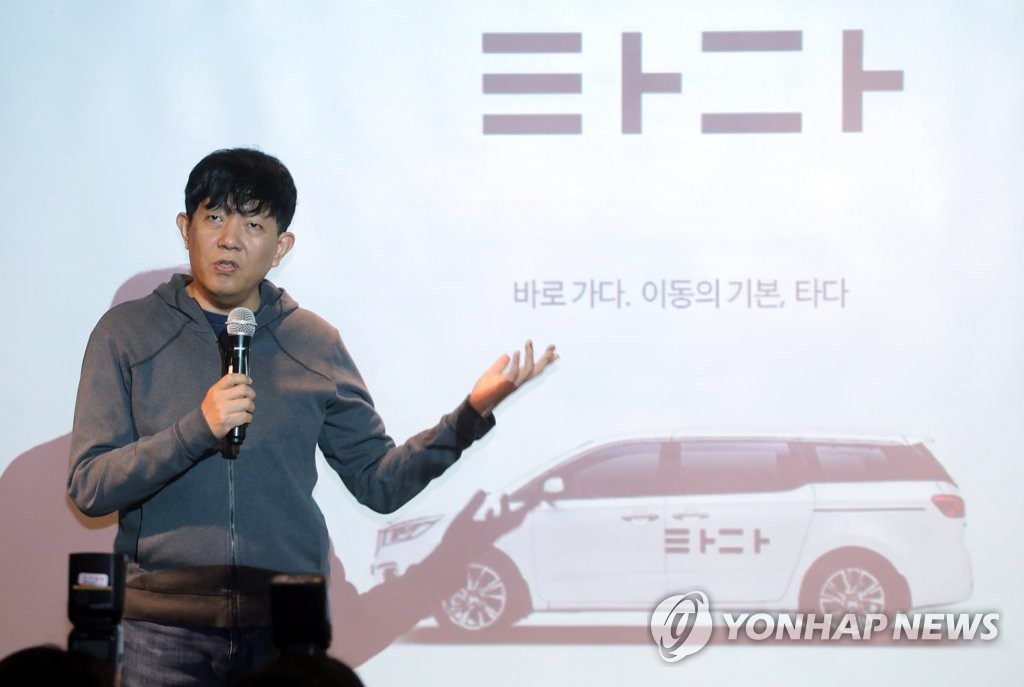- California Assembly OKs highest minimum wage in nation
- S. Korea unveils first graphic cigarette warnings
- US joins with South Korea, Japan in bid to deter North Korea
- LPGA golfer Chun In-gee finally back in action
- S. Korea won’t be top seed in final World Cup qualification round
- US men’s soccer misses 2nd straight Olympics
- US back on track in qualifying with 4-0 win over Guatemala
- High-intensity workout injuries spawn cottage industry
- CDC expands range of Zika mosquitoes into parts of Northeast
- Who knew? ‘The Walking Dead’ is helping families connect
Prosecutors indict ride-hailing service executives
South Korean prosecutors Monday indicted the heads of Tada, a ride-hailing service, declaring the app-based business illegal.
Lee Jae-woong, chief executive of car-sharing app operator SoCar, and Park Jae-uk, chief executive of its rental car hailing service unit, Value Creators & Company (VCNC), will face a trial without physical detention on charges of running a transportation business without a license, the Seoul Central District Prosecutors’ Office said. VCNC operates Tada service.
An association of taxi drivers in Seoul filed a complaint against the two businessmen in February.


This February 2019 file photo shows Lee Jae-woong, chief executive of car-sharing app operator SoCar, speaking during a news conference in Seoul. (Yonhap)
Tada was launched in October 2018 and has rapidly grown to become Korea’s leading ride-offering service. It operates mostly in the Seoul metropolitan area.
Taxi drivers claim that Tada threatens their livelihood and violates transportation law that forbids rented vehicles from offering rides in exchange for money.
Tada argues its business is within legal boundaries based on a written exception that specifically allows rented vans – or vans with 11 to 15 seats – to be offered with drivers.
The local taxi industry argues this is an arbitrary application of the rule, irrelevant to its original purpose of promoting tourism.
At issue will be whether Tada should be considered as a type of rental car service or an illegal taxi service operating without a license.
“Tada users think they are hailing a cab, not renting a car,” an investigator at the prosecution office said. “The key of Tada’s service is a paid taxi service, not a vehicle rental business that comes with a driver.”
Tada said it will make clear in the trial that its service is a legal business that meets changing customer demands in the mobility industry.
“The world is changing in response to people’s demand and technological advances,” Tada said in a release. “We expect the court’s new ruling.”
Lee, SoCar chief executive officer, criticized the prosecution for turning a blind eye to the changing mobility industry and the government’s move to ease the regulations that apply to new technologies, such as artificial intelligence (AI).
“Korean laws allow (Tada’s) operation. Police said it doesn’t violate laws after its own investigation, and the transportation ministry didn’t prohibit our service for more than a year,” Lee wrote on his Facebook page. “(Tada) is a service with over 1.3 million users and 9,000 drivers, and applied one of the largest number of AI technologies in real life.”
On Oct. 7, Tada announced plans to raise the number of its vans to 10,000 from the current 1,400 and that of contract drivers to 50,000 from 9,000 by the end of 2020.
Its expansion plan drew strong backlash from taxi drivers, forcing Tada to temporarily suspend the expansion plan and participate in the government-organized debate on restructuring the taxi industry.











